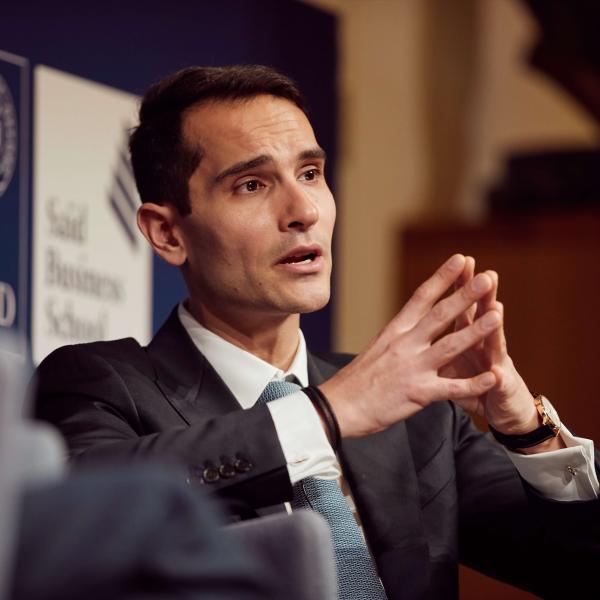About the event
Harvard Professor George Serafeim explores performance, purpose, and ESG issues
The idea that businesses can do well by doing good is gaining traction. But there is sometimes still the sense that caring about environmental, social, and governance (ESG) issues is a bit of a luxury, something for small, private, family-owned companies – and not for large, public corporations with profit-focused shareholders.
Indeed, until about a decade ago this would have been a fair analysis. Research by Harvard Business School Professor of Business Administration George Serafeim has revealed that companies that historically had relatively good ESG scores typically used to receive more pessimistic investment recommendations, as Wall Street analysts interpreted ESG concerns as ‘a waste of shareholder resources.’
But by the end of 2008 that pessimism had diminished: ‘It had become basically zero,’ concluded Serafeim. And attitudes are continuing to change. The United Nations-backed Principles for Responsible Investment (launched in 2006) now have over 2300 signatories; more than a quarter of companies have appointed Chief Sustainability Officers; and businesses regularly talk about their role in responding to problems such as environmental damage and social inequality.
Ways of thinking can be deeply entrenched, however. Delivering the Kim B Clark Fellowship Lecture at Oxford Saïd on 2 May 2019, Serafeim described how he attempted to enthuse one student about his then new elective course, Reimagining Capitalism: Business and Big Problems. ‘The student raised his hand and asked me if I had any established frameworks. I said, “No but it’s going to be great. It will be a journey of collaboration and co-discovery. It will be about innovation. It will be exciting …” He just stood up and left.’ Even when Serafeim sent out research papers for review, he said, a common response was, ‘I don’t know what you’re talking about.’
ESG policies and long-term performance
These people, and those pre-2008 analysts, were missing something. In another study, Serafeim and his colleagues looked at the corporations and organisations that were making significant commitments to addressing social and environmental issues. They discovered that early (voluntary) adopters of environmental and social policies tended to have made these issues the responsibility of the board. In their internal management accounts and control systems they typically had many more non-financial metrics. And they were much more likely to be long-term oriented both in their decision-making and how they communicated with their stakeholders.
More importantly, they outperformed their low-sustainability competitors over the long term. While the analysts and investors were dismissing sustainability efforts as a waste of shareholders’ resources, these organisations were in fact building their brands, relationships, and loyalty among their customers. This may not have paid off immediately, but over 20 years it did – and in spades. Companies that care about their carbon footprint, for example, or about creating more diverse workforces, were once trading at a discount. Now they are trading at a premium.

